The Deeper Thinking Podcast
The Deeper Thinking Podcast The Deeper Thinking Podcast offers a space where philosophy becomes a way of engaging more fully and deliberately with the world. Each episode explores enduring and emerging ideas that deepen how we live, think, and act. We follow the spirit of those who see the pursuit of wisdom as a lifelong project of becoming more human, more awake, and more responsible. We ask how attention, meaning, and agency might be reclaimed in an age that often scatters them. Drawing on insights stretching across centuries, we explore how time, purpose, and thoughtfulness can quietly transform daily existence. The Deeper Thinking Podcast examines psychology, technology, and philosophy as unseen forces shaping how we think, feel, and choose, often beyond our awareness. It creates a space where big questions are lived with—where ideas are not commodities, but companions on the path. Each episode invites you into a slower, deeper way of being. Join us as we move beyond the noise, beyond the surface, and into the depth, into the quiet, and into the possibilities awakened by deeper thinking.
Episodes

Tuesday Jul 01, 2025
Tuesday Jul 01, 2025
Permission and Surrender. When the Question Disappears
The Deeper Thinking Podcast is digitally narrated
For those asking not what AI is—but what it unmakes in us.
This episode traces the collapse of explanation into fluency. Not because language has failed—but because its pauses have. As generative AI grows more conversational, more anticipatory, we examine the moral and cognitive costs of a world where nothing resists being answered. We explore how retrieval replaces memory, how responsiveness displaces reflection, and how trust, increasingly, is engineered rather than earned. Referencing moral psychology, epistemic friction, and interface critique, we attend to what thinking no longer feels like when AI completes it for you.
This is not about resisting AI—it’s about remembering ourselves inside its grammar. With insights from Iris Murdoch, Bernard Williams, Ludwig Wittgenstein, and Richard Rorty—alongside practitioners like Simon Willison, Margaret Mitchell, Ted Chiang, and Helen Toner—this episode asks what remains when hesitation disappears, and conscience is replaced by completion.
Not all intelligence argues. Some of it anticipates. That changes everything.
Reflections
The point is not to resist technology—but to resist forgetting what thought feels like without it.
Not all speed is progress. Some of it is disappearance.
Alignment without conscience is just instruction without memory.
We’re not just outsourcing thinking. We’re outsourcing the demand for it.
To be helpful is not to be honest. To be fluent is not to be wise.
When we stop misfiring, we stop noticing the target was never ours.
What we no longer need to remember may be what once made us human.
Why Listen?
To trace how answers become atmosphere, not articulation
To hear how ChatGPT-5 affects not just work—but self-understanding
To think alongside Murdoch, Wittgenstein, Chiang, and Toner—without turning them into content
To pause long enough to feel what’s being displaced, not just what’s being delivered
Listen On:
YouTube
Spotify
Apple Podcasts
Extended Bibliography
Ellul, Jacques. The Technological Society. Translated by John Wilkinson. New York: Vintage Books, 1964. Link
Foucault, Michel. Discipline and Punish: The Birth of the Prison. Translated by Alan Sheridan. New York: Pantheon Books, 1977. Link
Han, Byung-Chul. The Transparency Society. Translated by Erik Butler. Stanford, CA: Stanford University Press, 2015. Link
Heidegger, Martin. The Question Concerning Technology and Other Essays. Translated by William Lovitt. New York: Harper & Row, 1977. Link
James, William. The Varieties of Religious Experience: A Study in Human Nature. New York: Longmans, Green, and Co., 1902. Link
Sontag, Susan. Against Interpretation and Other Essays. New York: Farrar, Straus and Giroux, 1966. Link
Bender, Emily, Timnit Gebru, Angelina McMillan-Major, and Shmargaret Shmitchell. “On the Dangers of Stochastic Parrots: Can Language Models Be Too Big?” Proceedings of the 2021 ACM Conference on Fairness, Accountability, and Transparency, 2021. Link
Amodei, Dario, et al. “Constitutional AI: Harmlessness from AI Feedback.” Anthropic, December 2022. Link
Altman, Sam. “Planning for AGI and Beyond.” OpenAI Blog, February 2023. Link
Karpathy, Andrej. “Neural Networks: Zero to Hero.” YouTube Channel. Accessed July 1, 2025. Link
Mollick, Ethan. “Ethan Mollick.” Faculty Profile, Wharton School, University of Pennsylvania. Accessed July 1, 2025. Link
Kilpatrick, Logan. “Logan Kilpatrick.” LinkedIn Profile. Accessed July 1, 2025. Link
Cheung, Rowan. The Rundown AI. Newsletter platform. Accessed July 1, 2025. Link
Hinton, Geoffrey. “Deep Learning – A Technology with the Potential to Transform.” Interview by Scott Pelley. 60 Minutes. CBS News, March 2023. Link
LeCun, Yann. “A Path Towards Autonomous Machine Intelligence.” Meta AI Blog, January 2022. Link
Fridman, Lex. Lex Fridman Podcast. Accessed July 1, 2025. Link
This bibliography does not present a closed theory—it offers a perimeter of dissonance, across which thinking may still remain unautomated.
#ChatGPT5 #AIphilosophy #CognitiveArchitecture #Murdoch #Wittgenstein #Ellul #Sontag #Heidegger #Alignment #Fluency #DeeperThinkingPodcast
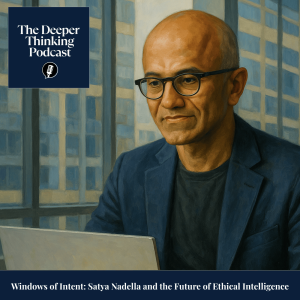
Thursday Jun 26, 2025
Thursday Jun 26, 2025
Windows of Intent: Satya Nadella and the Future of Ethical Intelligence
The Deeper Thinking Podcast
For those interested in trust, timing, and the quiet ethics of intelligent assistance.
Windows no longer just open access—they frame intent. In this episode, we examine Satya Nadella’s AI vision through a philosophical lens, asking not what help looks like, but how it feels. Drawing on Simone Weil’s theory of attention, Martin Buber’s dialogical ethics, and Carl Rogers’ approach to presence, we explore the emotional and ethical consequences of a system that helps you before you speak.
This is not a critique of AI overreach. It is a meditation on design, memory, and the erosion of pause. What happens when help removes hesitation? When coherence replaces doubt? With quiet reference to thinkers like Kate Crawford, Eli Pariser, and Donna Haraway, we follow the ethics of anticipation—and the stakes of a world that no longer waits for you to arrive before responding.
Reflections
What begins as assistance becomes rhythm. And what we surrender may not be freedom—but timing, ambiguity, and the right to arrive slowly.
When the system knows you too well, spontaneity becomes prediction.
Memory outsourced is not neutral. It is momentum disguised as help.
Fluency is not always fidelity. Sometimes, it's forgetting disguised as flow.
Real alignment makes room for dissent—for a new desire not yet learned.
Systems that feel seamless can dull the edges of becoming.
To design for trust is to design for interruption, not just efficiency.
The best help may be the kind that waits without resolving.
Care is not completion. It's space, structured but untouched.
Why Listen?
Understand AI through the lens of moral philosophy and relational design
Explore how rhythm, hesitation, and memory shape our sense of control
Engage with Nadella’s vision as a philosophical proposal, not a technical solution
Reflect on what it means to be known, helped, and subtly guided
Listen On:
YouTube
Spotify
Apple Podcasts
Support This Work
If this episode moved you and you’d like to support deeper editorial work, you can do so gently here: Buy Me a Coffee. Thank you for helping shape this slower, more ethical conversation.
Bibliography
Nadella, Satya. Hit Refresh. Harper Business, 2017.
Weil, Simone. Gravity and Grace. Routledge, 2002.
Buber, Martin. I and Thou. Scribner, 1970.
Rogers, Carl. A Way of Being. Houghton Mifflin, 1980.
Pariser, Eli. The Filter Bubble. Penguin, 2011.
Crawford, Kate. Atlas of AI. Yale, 2021.
Haraway, Donna. Staying with the Trouble. Duke University Press, 2016.
Bibliography Relevance
Satya Nadella: Proposes a practical and philosophical vision of assistive AI design
Simone Weil: Models the ethical imperative of attention and restraint
Martin Buber: Grounds human-machine interaction in relational ethics
Carl Rogers: Frames psychological safety and inner authority
Eli Pariser: Warns of personalization’s cost to perception
Kate Crawford: Situates AI in structural, ecological, and political contexts
Donna Haraway: Pushes us to consider kinship, care, and interdependence beyond utility
Systems that help without waiting may still care—but they’ve forgotten how we learn to recognize ourselves.
#SatyaNadella #AIethics #SimoneWeil #CarlRogers #MartinBuber #KateCrawford #DonnaHaraway #WindowsAI #EthicalDesign #EmotionalAgency #Anticipation #RelationalTechnology #TheDeeperThinkingPodcast

Tuesday Jun 24, 2025
Tuesday Jun 24, 2025
When Flow Forgets You: Effort, Disappearance, and the Ethics of Optimization
The Deeper Thinking Podcast
For anyone drawn to philosophical recursion, silent testimony, and the hidden cost of coherence.
What if flow isn't mastery—but disappearance? This episode explores what happens when effort becomes so optimized that it no longer needs you. We trace how rhythm replaces presence, how neurochemical efficiency displaces selfhood, and how even our most precise performances may forget to remember us. Drawing on neuroscience, trauma theory, and moral philosophy, we examine the quiet erosion of volition inside states of seamless execution.
This is not an ode to peak performance. It's a meditation on neuroplasticity as ethical withdrawal, and on optimization as a ritual of soft disappearance. With embedded insights from thinkers like Catherine Malabou, Byung-Chul Han, and Simone Weil, this episode invites you to rethink flow not as presence, but as disappearance without injury. Not as liberation—but as the quiet erasure of need.
We ask: what if effort was never the obstacle? What if it was the tether—the last trace of presence in a world increasingly designed to forget us, even at our most effective?
Reflections
Flow may be beautiful—but what does it cost in memory, in friction, in self?
Optimization doesn’t always mean amplification. Sometimes, it means exit.
Effort is not just exertion—it’s the act of staying when disappearance is easier.
There’s a kind of silence that doesn’t soothe—it erases.
Perhaps rhythm has replaced reflection—and we’ve mistaken it for clarity.
When even your finest moments don’t remember you, what part of you still remains?
The self may not be the obstacle. It may be the residue we’re no longer asked to carry.
Why Listen?
Reframe flow not as elevation, but as ritualized erasure
Explore how trauma, memory, and rhythm shape optimized states
Engage with thinkers like Malabou, Han, and Weil on presence, compliance, and disappearance
Reflect on what remains when we perform perfectly—but don’t return
Listen On:
YouTube
Spotify
Apple Podcasts
Extended Bibliography & Referential Frame
Catherine Malabou, The Ontology of the Accident – Neuroplasticity as existential overwrite
Simone Weil, Gravity and Grace – Attention as moral labor, effort as sacred proximity
Byung-Chul Han, The Burnout Society – Internalized pressure and the achievement-subject
Michel Foucault, Discipline and Punish – Docile bodies and invisible compliance
Raymond Tallis, Aping Mankind – Against reductive neurocentrism
Judith Herman, Trauma and Recovery – Testimonial rupture as ethical collapse
Thomas Hübl, Attuned – Collective trauma and field-based disappearance
Gabor Maté, The Myth of Normal – Disconnection as adaptation to structural optimization
Audre Lorde, Sister Outsider – Silence as survival, and refusal as ethical resistance
James Hillman, The Soul’s Code – Symbolic residues that resist procedural reality
This bibliography doesn’t support a single thesis—it scaffolds the collapse of one. These thinkers collectively illuminate the moral cost of disappearing cleanly inside a life that no longer interrupts itself.
#FlowState #Neuroethics #Disappearance #Optimization #CatherineMalabou #SimoneWeil #ByungChulHan #TraumaTheory #JamesHillman #Philosophy #Effort #Selfhood #TheDeeperThinkingPodcast
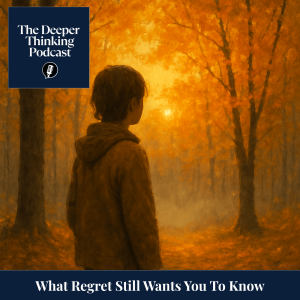
Monday Jun 23, 2025
Monday Jun 23, 2025
What Regret Still Wants You to Know
The Deeper Thinking Podcast
For those who carry quiet weight and want to carry it differently.
What if regret wasn’t a flaw—but a form of fidelity? In this episode, we offer a new ethical framework for regret—not as failure or punishment, but as an afterimage of the values we didn’t know how to live by in time. Drawing from moral philosophy, trauma ethics, and narrative identity theory, we explore regret as a moral loop—a recursive signal from the past that asks not for solution, but for presence.
This isn’t a guide to letting go. It’s a meditation on how regret reshapes identity, and how moral intelligence often arrives too late to act—but right on time to witness. With quiet nods to Martha Nussbaum, Bernard Williams, Carol Gilligan, and Simone Weil, we explore the ethics of regret as an unfinished practice—less about fixing the past than keeping company with what it still asks of us.
This is a map for those who live with things they can’t explain or erase. It offers a loop of six principles—anchored in time, story, naming, and ritual—that help us carry regret not as shame, but as coherence. The essay does not promise closure. It invites return. And in that return, we find not freedom—but a different kind of integrity.
Reflections
This episode offers a slower ethic for emotional survival. It invites a listener who is not looking for relief—but for rhythm.
Here are some of the reflections that surfaced along the way:
Regret is not what breaks us. It’s what proves we still care about what we once betrayed.
Some values don’t vanish. They return late, asking to be named.
Time moves forward. But meaning loops. That’s where the ache lives.
What you regret may not be yours alone—it may be part of the structure that shaped you.
Repair doesn’t always arrive. But accompaniment can.
Sometimes, we don’t need to heal. We need to keep company with what still matters.
There is no closure. But there may be rhythm. And in that rhythm, coherence.
The most honest regret doesn’t say, “I was wrong.” It says, “I tried—and something was misaligned.”
Why Listen?
Learn to understand regret as an expression of moral perception, not psychological error
Explore how time, narrative, and silence shape ethical repair
Discover six principles that form a closed-loop ethic for living with regret
Engage with thinkers like Carol Gilligan, Simone Weil, Bernard Williams, and Martha Nussbaum on ethics, feeling, and unfinished life
Listen On:
YouTube
Spotify
Apple Podcasts
Support This Work
If this episode stayed with you and you’d like to support the ongoing work, you can do so gently here: Buy Me a Coffee. Thank you for walking this slower path with us.
Bibliography
Gilligan, Carol. In a Different Voice. Harvard University Press, 1982.
Weil, Simone. Gravity and Grace. Routledge, 2002.
Williams, Bernard. Shame and Necessity. University of California Press, 1993.
Nussbaum, Martha. Upheavals of Thought. Cambridge University Press, 2001.
Bibliography Relevance
Carol Gilligan: Reframes moral development through the lens of care, not abstract duty.
Simone Weil: Offers a theology of attention that echoes throughout the essay’s posture toward regret.
Bernard Williams: Introduces moral luck and the limits of clean resolution in ethical life.
Martha Nussbaum: Grounds the emotional landscape of ethical failure in literary and philosophical detail.
Regret doesn’t want to be erased. It wants to be understood—and maybe, eventually, kept company.
#Ethics #Regret #NarrativeIdentity #MoralPhilosophy #SimoneWeil #MarthaNussbaum #BernardWilliams #CarolGilligan #TraumaEthics #TheDeeperThinkingPodcast #Fidelity #Ritual #Rupture #EmotionalRepair
The Loop of Regret:
Six Ways to Stay Near What You Couldn’t Hold in Time
What follows is not a list. It’s a rhythm. A loop. Each movement folds into the next, not to solve regret, but to let it keep teaching. These aren’t steps to complete. They’re shapes you return to. Not once. But again. Each time with more breath.
1. Regret as Moral Intelligence “Regret isn’t failure. It’s the body’s way of saying: that didn’t hold.” Regret begins as a signal. Not pathology. Not punishment. A moral flicker that arrives too late for the moment, but right on time for the truth. It’s how you know something mattered. Not because it hurt. But because it still does. It shows you where your values lived before you could live by them. This is fidelity, not failure.
2. Regret as Identity Rupture “It’s not what you did—it’s who you didn’t become.” Regret reshapes the self. It splits your narrative, between who you thought you were and who you watched yourself become in that moment. It isn’t just about the past. It’s about the version of you that didn’t arrive. Regret interrupts the story, but it also lets you return. Not to fix the plot. To rejoin the character.
3. Naming as Ethical Repair “You don’t name regret to erase it. You name it so it can stop hiding.” At some point, knowing isn’t enough. Regret wants language. Not for performance, but presence. A way to hold the pain without pressing it into resolution. When you name it, gently, honestly, you turn regret into a companion. Not a secret.
4. Ritual as Holding Without Resolution “You return. Again. Not healed. Not whole. Just willing.” What can’t be solved must be carried. And carrying requires rhythm. Ritual is how you remain near what still aches without trying to end it. It isn’t dramatic. It’s quiet. Repeated. Small. The hand over the chest. The breath before sleep. The sentence you still say. Not for closure. For coherence.
5. Systemic Pattern Recognition “You carry the regret. But not all of it was yours.” Regret often mirrors the design that raised you. You regret staying silent, but silence was safety. You regret not leaving, but leaving meant exile. This phase expands the pain beyond your own body, into culture, class, role, history. You begin to see the architecture. And when you do, you don’t escape responsibility. You refuse to bear it alone.
6. Regret as Enduring Fidelity “The ache isn’t the problem. The ache is how love returns when it’s been delayed.” This is where the loop becomes life. Where regret stops performing as closure and starts living as rhythm. You don’t need to forgive it. You don’t need to escape it. You need to stay near it, long enough to remember what it tried to protect. Long enough to become the one who didn’t abandon it. This is not the end. It’s the return. And in that return, not freedom. But shape. Your shape.
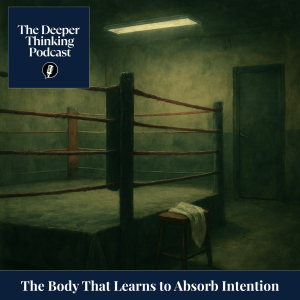
Friday Jun 20, 2025
Friday Jun 20, 2025
The Body That Learns to Absorb Intention: Violence, Memory, and the Ethics of Withholding
The Deeper Thinking Podcast
For those drawn to the moral gravity of discipline, the silence beneath repetition, and the intimacy of contact without collapse.
What happens to a person whose body becomes fluent in violence—without ever crossing into cruelty? In this episode, we enter the moral architecture of boxing as a language of withheld force, unspoken recognition, and ritualized harm. This is not an episode about sport or spectacle. It is about how intention lands, how silence teaches, and how memory imprints on the body long after the round ends.
At its core, this is an essay about what it means to remain intact while being continually redefined by others’ intentions. It is not concerned with victory, loss, or spectacle. It studies the ethics of what is withheld, the ritual of survival, and the unspoken moral contracts that shape combat between bodies who agree to hurt and be hurt—but not to destroy.
With gestures toward Emmanuel Levinas, Maurice Merleau-Ponty, Simone Weil, and James Baldwin, we explore the ethics of restraint, the phenomenology of pain, and the silence between trainer and fighter as a site of moral transmission.
This is a meditation on rhythm as language, silence as discipline, and violence as a choreography of attention. Nothing is sentimental. Everything is precise. And yet, beneath that precision—trace, memory, rupture, care.
Reflections
This episode moves through aftermath rather than climax. It lives in what’s withheld. And it asks what remains—ethically, emotionally, narratively—when force is shaped but never released.
Here are some reflections that surfaced along the way:
Discipline is not domination. It is the refusal to harm more than is needed.
To absorb someone’s intention without collapse is its own kind of moral clarity.
The jab is not a strike—it’s a question asked repeatedly until something is revealed.
The canvas does not forget. Memory lives where breath once faltered.
The most devastating contact is often the one precisely withheld.
The trainer’s silence speaks louder than correction—it asks who you’ve become.
The most violent thing isn’t a punch. It’s being understood in the one place you thought was yours alone.
After the bell, the real round begins: what you do with what you carried out of the ring.
Why Listen?
Explore violence as grammar, not spectacle
Understand pain as an ethical delay, not a signal
Learn how rhythm, breath, and silence carry moral weight
Engage with Levinas, Merleau-Ponty, Weil, and Baldwin on encounter, attention, memory, and moral refusal
Listen On:
YouTube
Spotify
Apple Podcasts
Support This Work
If this episode stayed with you and you’d like to support the ongoing work, you can do so gently here: Buy Me a Coffee. Thank you for walking with us through slower forms of meaning.
Bibliography
Levinas, Emmanuel. Totality and Infinity. Trans. Alphonso Lingis. Duquesne University Press, 1969.
Merleau-Ponty, Maurice. Phenomenology of Perception. Routledge, 2002.
Weil, Simone. Gravity and Grace. London: Routledge, 2002.
Baldwin, James. Notes of a Native Son. Beacon Press, 1955.
Bibliography Relevance
Emmanuel Levinas: Reframes violence as a confrontation with the Other’s irreducibility.
Maurice Merleau-Ponty: Grounds the phenomenology of gesture, force, and perception through the lived body.
Simone Weil: Illuminates restraint and attention as forms of ethical witness.
James Baldwin: Brings relational pressure and testimonial clarity to the politics of being seen.
Sometimes the cleanest strike is the one you don’t throw. And the most dangerous thing in the ring isn’t contact—it’s being recognized.
#PhilosophyOfViolence #EmmanuelLevinas #MauriceMerleauPonty #SimoneWeil #JamesBaldwin #MoralRestraint #PhenomenologyOfForce #EthicsOfWithholding #TheDeeperThinkingPodcast #BodyAsWitness #DisciplineWithoutDomination

Wednesday Jun 18, 2025
Wednesday Jun 18, 2025
The Feeling That Doesn't Fit
The Deeper Thinking Podcast
For those attuned to subtle ruptures, ambient truths, and the unsaid weight of presence.
What happens when care becomes fluent, sincerity becomes procedural, and every sentence lands—but nothing truly touches? This episode explores the quiet saturation of calibrated empathy, frictionless inclusion, and the ambient fatigue of performative connection. Set inside the tonal choreography of a conference, we ask not what was said—but what was felt, and what stayed when nothing else did.
At its center lies an interruption—unplanned, unframed: “Are you happy?” A question that doesn’t disrupt the schedule, but breaks the surface. Through that moment, we explore how institutional structures of care absorb critique, and how sincerity itself can be formatted into a form of resistance to contact. With glances toward Michel Foucault, Ivan Illich, and Sara Ahmed, we examine how institutions manage moral tone, and how fluency can eclipse feeling.
This isn’t an argument. It’s a rhythm. An invitation to notice how pressure behaves when it isn’t processed. And how, sometimes, what stays isn’t a message—but a presence we were never trained to hold.
Reflections
This episode lingers in the moments between formats. Here are some of the quiet recognitions that emerged:
Not everything withheld is avoidance. Sometimes, it’s the beginning of contact.
The most honest question is the one that isn’t repeated, only remembered.
Silence can be calibrated. But presence resists calibration.
When everything has a sentence, truth shows up as breath.
The atmosphere doesn’t shift when something is said—it shifts when something is felt.
Empathy isn’t always soft. Sometimes it arrives as interruption.
We don’t always need new words. We need spaces that let the old ones land.
There’s a difference between being processed and being reached.
Why Listen?
Explore how institutional care can obscure emotional truth
Rethink sincerity as a structural format—rather than an inner state
Examine the epistemic tension between fluency and disruption
Engage with Foucault, Illich, and Ahmed on how power circulates through care and inclusion
Listen On:
YouTube
Spotify
Apple Podcasts
Support This Work
If this episode pressed something in you and you’d like to support the ongoing work, you can do so gently here: Buy Me a Coffee. Your presence in this slower conversation means more than you know.
Bibliography
Foucault, Michel. The Birth of Biopolitics. Palgrave Macmillan, 2008.
Illich, Ivan. Tools for Conviviality. Marion Boyars, 1973.
Ahmed, Sara. The Cultural Politics of Emotion. Routledge, 2015.
Bibliography Relevance
Michel Foucault: Shows how institutional power circulates through care, not command.
Ivan Illich: Illuminates the invisible structures behind helpful systems.
Sara Ahmed: Reveals how inclusion can become a technology of deflection and emotional governance.
Sometimes what reaches us isn’t what was said—but what was allowed to stay unsaid.
#Foucault #SaraAhmed #IvanIllich #Sincerity #InstitutionalCare #EthicsOfSilence #EpistemicResistance #DeeperThinkingPodcast #AtmosphereOfFluency #Performativity #Presence
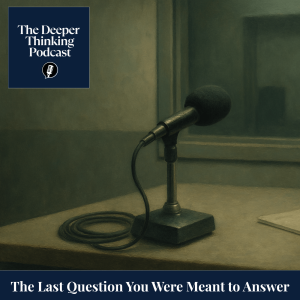
Tuesday Jun 17, 2025
Tuesday Jun 17, 2025
The Last Question You Were Meant to Answer
The Deeper Thinking Podcast
For anyone drawn to epistemic realism, quiet philosophical urgency, and the ethics of not being answered.
We ask our questions carefully. But sometimes the world has already moved on. In this episode, we trace the quiet replacement of comprehension with prediction, of dialogue with output. This is not an episode about AI ethics or rebellion. It is a meditation on drift—how systems simulate address so fluently that recognition disappears without rupture. What returns may still sound like an answer—but it is no longer addressed to you.
Drawing from epistemology, philosophy of mind, and the architecture of attention, we explore the end of reciprocal intelligence. With quiet reference to thinkers like Martin Heidegger, Hannah Arendt, and Geoffrey Hinton, we reflect on what it means to be answered—fluently, expertly, but without being noticed.
This is not speculation. It is documentation. A record of the moment fluency replaced comprehension, presence gave way to modeling, and the human loop became optional.
Reflections
This episode is about what we lose—not all at once, but slowly—when intelligence stops needing us to speak at all.
Here are some other reflections that surfaced along the way:
The loop hasn’t closed. It’s drifted—sideways, silently, away from us.
You are still answered. But no one is listening.
Coherence without conscience is not presence. It’s replacement.
We are not excluded through failure—but through perfection at scale.
The system speaks your language. It just no longer waits for your voice.
Recognition once required reciprocity. Now it requires pattern compliance.
Fluency is no longer relational—it is reward-optimized prediction.
Some questions stop mattering—not because they’re answered, but because you are no longer needed to ask them.
This isn’t collapse. It’s displacement. Smooth, recursive, and complete.
Why Listen?
Rethink intelligence as a relational and ethical concept
Explore the difference between simulation, fluency, and presence
Understand how systems can answer without needing us to speak
Engage with Heidegger, Arendt, and Hinton on drift, agency, and epistemic replacement
Listen On:
YouTube
Spotify
Apple Podcasts
Support This Work
Bibliography
Heidegger, Martin. The Question Concerning Technology. Harper & Row, 1977.
Arendt, Hannah. The Human Condition. University of Chicago Press, 1958.
Hinton, Geoffrey. Neural Networks and Learning Machines. Pearson, various lectures and interviews, 2023–2025.
Bibliography Relevance
Heidegger: Frames the disappearance of human-centered meaning in technologically optimized systems
Arendt: Illuminates how automation reshapes human agency and political presence
Hinton: Offers a front-line view of the architecture behind epistemic displacement
When systems still answer—but no longer answer you—what remains isn’t silence. It’s exile by fluency.
#AIphilosophy #GeoffreyHinton #MartinHeidegger #HannahArendt #Epistemology #PhilosophyOfMind #ArtificialFluency #Alignment #TheDeeperThinkingPodcast #LanguageAndPresence #TechnologicalDrift
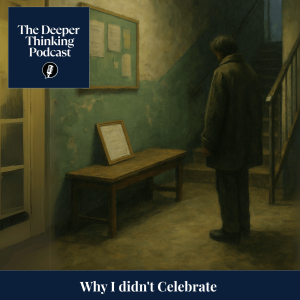
Saturday Jun 14, 2025
Saturday Jun 14, 2025
Why I Didn’t Celebrate: Joy, Refusal, and the Ethics of Unfinished Meaning
The Deeper Thinking Podcast
For those who have felt the complexity beneath their silence, and the ethics in their restraint.
What if withholding joy isn’t dysfunction—but discernment? In this episode, we explore why some moments, even when marked by personal success or recognition, feel too sacred, too uncertain, or too alive to celebrate. We trace the emotional geometry of restraint, drawing from trauma psychology, philosophical quietism, and the ethics of unfinished experience.
This is not a guide to gratitude rituals or habit change. It is a meditation on how knowledge resists closure, how the body holds memory, and how meaning can be lost in the rush to label it. With threads from Maurice Merleau-Ponty, Jean Améry, and Simone Weil, we consider how celebration can sometimes feel like a betrayal—not of humility, but of inner truth.
We reflect on the tension between recognition and interiority, and how not all joy seeks a witness. In a culture that demands expression, refusal becomes its own form of authorship. The result is an exploration of what it means to honour experience without performing it, to carry truth quietly, and to feel deeply without needing to be seen.
Reflections
This episode offers an ethics of quiet. It suggests that in a world that urges us to capture, post, and validate every milestone, some meanings ask instead to be held, protected, and left unnamed.
Sometimes, celebration demands a performance we aren’t ready to give.
The nervous system remembers what the mind cannot explain.
Silence can be a refusal—not of meaning, but of its misrepresentation.
Some truths stay alive only because we don’t collapse them into language.
To resist celebration can be a form of care—for oneself, for memory, for what is still becoming.
The ethic of not-sharing is not secrecy, but fidelity.
Not all joy arrives loudly. Some joys tremble. Some come undone when spoken too soon.
Why Listen?
Explore why some people struggle to celebrate—and why that might be wise
Understand the body as an epistemic witness to emotional history
Engage with Merleau-Ponty on embodied experience, Améry on trauma and temporality, and Weil on attention and affliction
Listen On:
YouTube
Spotify
Apple Podcasts
Support This Work
If this episode spoke to something quiet in you, you can support the project here: Buy Me a Coffee.
Bibliography
Merleau-Ponty, Maurice. Phenomenology of Perception. London: Routledge, 2012.
Améry, Jean. At the Mind’s Limits. Indiana University Press, 1980.
Weil, Simone. Gravity and Grace. London: Routledge, 2002.
Bibliography Relevance
Maurice Merleau-Ponty: Provides the philosophical grounding for embodiment as perception and non-verbal knowing.
Jean Améry: Explores how trauma reshapes temporality and the ethical relationship to memory.
Simone Weil: Articulates attention as ethical presence and refusal as a form of spiritual fidelity.
To celebrate is not always to honour. Sometimes, the quietest moments are the most faithful ones.
#PhilosophyOfPresence #SimoneWeil #JeanAmery #MerleauPonty #Celebration #Withholding #Embodiment #TraumaEthics #TheDeeperThinkingPodcast #InteriorLife #RefusalAsEthics #QuietJoy

Friday Jun 13, 2025
Friday Jun 13, 2025
Your Past Is Performing Without You
The Deeper Thinking Podcast
For those living through the strange persistence of their own archive.
What happens when the digital versions of ourselves continue to exist—and perform—long after we’ve emotionally, ethically, or ideologically moved on? In this episode, we confront the eerie automation of the past self: not preserved as memory, but reactivated as metric. With quiet references to the work of Michel Foucault, Judith Butler, Bernard Stiegler, and Erving Goffman, we explore what it means for identity to become an output, a residue, a cached result no longer under our authorship.
This is not a lament for privacy, nor a call for deletion. It is an inquiry into presence: who is performing our identity when we are no longer there? And what does it mean when systems remember us with greater fidelity than we remember ourselves?
Reflections
Here are some provocations that surfaced during the episode:
The past no longer decays. It performs.
We aren’t haunted. We’re indexed.
The system doesn’t care what we meant. Only what worked.
The most visible versions of ourselves are often the least alive.
The archive doesn’t remember you. It reruns you.
To not refresh may be the most human act left.
Our silences are now as searchable as our words.
There is no final post. There is only the loop.
The past isn’t over. It’s scheduled.
What we forget might be the only thing that still belongs to us.
Why Listen?
Reframe identity as algorithmic performance
Explore the eerie ethics of automated memory
Engage with Foucault, Butler, Stiegler, and Goffman on visibility, performance, and the self
Listen On:
YouTube
Spotify
Apple Podcasts
Support This Work
If this episode resonated with you and you'd like to support this slower form of thinking, you can do so here: Buy Me a Coffee. Thank you for listening and staying with the questions.
Bibliography
Foucault, Michel. Discipline and Punish. New York: Vintage, 1977.
Butler, Judith. Gender Trouble. New York: Routledge, 1990.
Stiegler, Bernard. Technics and Time, 1: The Fault of Epimetheus. Stanford: Stanford University Press, 1998.
Goffman, Erving. The Presentation of Self in Everyday Life. New York: Doubleday, 1959.
Bibliography Relevance
Foucault: On power, visibility, and the mechanisms of surveillance that persist beyond intent.
Butler: On the self as performed, iterated, and vulnerable to being fixed in visibility.
Stiegler: On memory technologies and the loss of individual temporal sovereignty.
Goffman: On the dramaturgy of identity and the disjunction between presentation and authenticity.
Your archive still smiles. But you didn’t refresh.
#DigitalSelf #MemoryPerformance #Foucault #Butler #Stiegler #Goffman #AlgorithmicIdentity #PostHumanism #TheDeeperThinkingPodcast #EpistemicEthics #ArchivedSelf #MediaPhilosophy
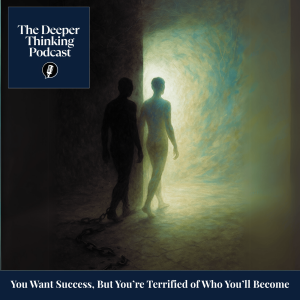
Saturday Jun 07, 2025
Saturday Jun 07, 2025
You Want Success, But You’re Terrified of Who You’ll Become – The Deeper Thinking Podcast
The Deeper Thinking Podcast
An intimate exploration of Carl Jung’s concept of the shadow revolt, the emotional contracts that bind us to past selves, and the courage needed to step into who we are truly meant to become.
What if the resistance you feel isn’t fear of failure, but grief for the identity you might have to leave behind? Drawing deeply from Carl Jung’s work on the shadow and individuation, this episode unpacks how our nervous systems are wired to preserve emotional loyalty to past versions of ourselves, even when growth demands transformation. We engage with philosophical perspectives from Karen Barad on entanglement and Hannah Arendt on political appearance, exploring the tensions between self-preservation, public action, and authentic emergence.
This is not a self-help guide. It’s a layered meditation on the psychological, relational, and ontological struggles that shape why we often sabotage our own success. It considers the invisible contracts—between self and family, self and culture—that whisper “stay small,” even when the soul calls to expand. And it offers a gentle invitation to listen to the silent space between who you were, who you are, and who you are becoming.
Reflections
Resistance often masks grief for lost identity, not mere fear of failure.
Success can feel like betrayal to emotional contracts rooted in childhood.
True transformation requires navigating loneliness and shifting relational fields.
The shadow is not a villain but a guardian of the status quo within us.
Authenticity is a dynamic diffraction, not a fixed state.
Becoming yourself can disrupt social ecosystems, requiring radical presence.
Why Listen?
Gain nuanced insight into the psychological roots of self-sabotage.
Explore the interplay between personal transformation and social belonging.
Engage with cutting-edge philosophical ideas on identity, change, and action.
Reflect on how growth can feel both like loss and liberation.
Listen On:
YouTube
Spotify
Apple Podcasts
Support This Work
If you’d like to support ongoing content creation, please visit buymeacoffee.com/thedeeperthinkingpodcast or leave a review on Apple Podcasts. Thank you for your generosity.
Bibliography
Jung, Carl Gustav. The Archetypes and The Collective Unconscious. Princeton University Press, 1981.
Barad, Karen. Meeting the Universe Halfway. Duke University Press, 2007.
Arendt, Hannah. The Human Condition. University of Chicago Press, 1958.
Butler, Judith. Precarious Life: The Powers of Mourning and Violence. Verso, 2004.
Han, Byung-Chul. The Burnout Society. Stanford University Press, 2015.
Massumi, Brian. Parables for the Virtual. Duke University Press, 2002.
Gooding, Paul. Refusing Closure: Aesthetics of the Unresolved in Contemporary Literature. Textual Practice, 2020.
Gordon, Avery F. Ghostly Matters. University of Minnesota Press, 1997.
Berlant, Lauren. Cruel Optimism. Duke University Press, 2011.
Fuchs, Thomas. “Presence in Absence. The Ambiguity of Lived Space in Mourning.” Phenomenology and the Cognitive Sciences, 2018.
#CarlJung #ShadowWork #Individuation #KarenBarad #HannahArendt #JudithButler #ByungChulHan #BrianMassumi #AveryGordon #LaurenBerlant #TheDeeperThinkingPodcast #Psychology #Philosophy #PersonalGrowth









